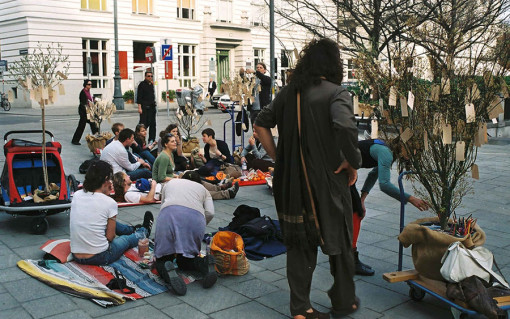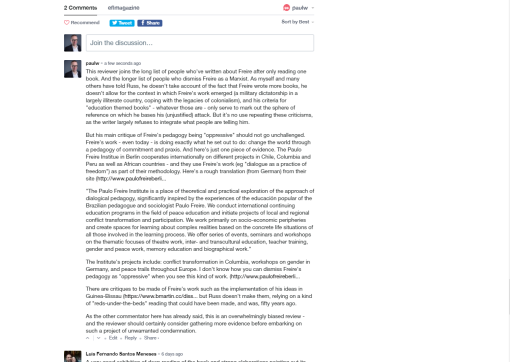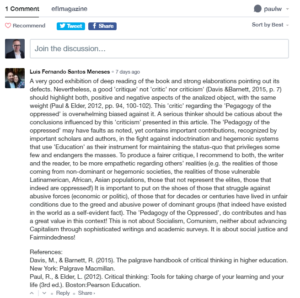I read Russ Maynes’ review and it gave me pedagogical indigestion. Like all fried food it looked appealing at first, went down relatively easily, but after eating it you’re left with a feeling of emptiness, and then remorse. Because his Fried Freire – just dust with Marxism and cook! – is a tasteless version of the real thing.
Background. I’ve been dismayed by Russ’ recent posts on critical pedagogy and Freire and like others have communicated this to him, to little use. He admits his ignorance of critical pedagogy and Freire but then proceeds to denigrate Freire’s work; he complains of Freire’s conjecture and lack of evidence but then won’t admit the weakness of his own conjecture and the paucity of evidence he offers. He positions his critique as neutral when no such position exists. Who taught us that?
Washing one’s hands of the conflict between the powerful and the powerless means to side with the powerful, not to be neutral.—Paulo Freire.
So I’m puzzled. If you don’t know about Freire – why write about him? And importantly, what work does such a caricature of his work do? What does it hide – or reveal?
***
After a Twitter exchange in which any dialogue quickly descended into the kind of evil-good ‘pile on’ that social media tends to provoke (and for which I take some responsibility for), I’d like to put my point of view. To repeat, I have nothing against Russ personally but I do object to how he has repeatedly mischaracterized Freire’s work. And I simply want to know why? Why go out of your way to review something you neither like nor understand? Why presume to review someone’s entire pedagogy on the basis of reading only one of their many books? And what, simply, is the issue with Freire?
So today I commented on Russ’ post. Strangely, as soon as I posted the comment, it was immediately deleted. This happened three times. Perhaps someone made a mistake at the efl magazine website. Three times.
Or perhaps this proves Freire’s dictum that “If the structure does not permit dialogue the structure must be changed,” and seems to go against efl magazine founder Philip Pound’s promise of robust debate and the editors’ invitation on Twitter: “You’re welcome to write a response
But apparently we’re not. The thing is, a comment gets automatically published then I guess someone has to delete it manually (or perhaps the editors can say why it wasn’t allowed up?) so here’s a screenshot of the comment I posted …
… a comment which definitely isn’t there now:
Well, whatever. If I’m blocked by efl magazine from discussing this, then here is what I wanted to say.
This reviewer joins the long list of people who’ve written about Freire after only reading one book. And the longer list of people who dismiss Freire as a Marxist. As myself and many others have told Russ, he doesn’t take account of the fact that Freire wrote more books, he doesn’t allow for the context in which Freire’s work emerged (a military dictatorship in a largely illiterate country, coping with the legacies of colonialism), and his criteria for “education themed books” – whatever those are – only serve to mark out the sphere of reference on which he bases his (unjustified) attack. But it’s no use repeating these criticisms, as the writer largely refuses to integrate what people are telling him.
But his main critique of Freire’s pedagogy being “oppressive” should not go unchallenged. Freire’s work – even today – is doing exactly what he set out to do: change the world through a pedagogy of commitment and praxis. And here’s just one piece of evidence. The Paulo Freire Institute in Berlin cooperates internationally on different projects in Chile, Columbia and Peru as well as African countries – and they use Freire’s work (eg “dialogue as a practice of freedom”) as part of their methodology. Here’s a rough translation (from German) from their site (http://www.paulofreireberlin.org/uberuns):
“The Paulo Freire Institute is a place of theoretical and practical exploration of the approach of dialogical pedagogy, significantly inspired by the experiences of the educación popular of the Brazilian pedagogue and sociologist Paulo Freire. We conduct international continuing education programs in the field of peace education and initiate projects of local and regional conflict transformation and participation. We work primarily on socio-economic peripheries and create spaces for learning about complex realities based on the concrete life situations of all those involved in the learning process. We offer series of events, seminars and workshops on the thematic focuses of theatre work, inter- and transcultural education, teacher training, gender and peace work, memory education and biographical work.”
The Institute’s projects include: conflict transformation in Columbia, workshops on gender in Germany, and peace trails throughout Europe. I don’t know how you can dismiss Freire’s pedagogy as “oppressive” when you see this kind of work. (http://www.paulofreireberlin.org/projekte)
 (photo from http://www.konfliktkultur.at/en/discover-peace-in-europe/)
(photo from http://www.konfliktkultur.at/en/discover-peace-in-europe/)
There are critiques to be made of Freire’s work such as the implementation of his ideas in Guinea-Bissau (https://www.bmartin.cc/dissent/documents/Facundo/section7.html) but Russ doesn’t make them, relying on a kind of “reds-under-the-beds” reading that could have been made, and was, fifty years ago.
As the other commentator here has already said, this is an overwhelmingly biased review – and the reviewer should certainly consider gathering more evidence before embarking on such a project of unwarranted condemnation.
***
More than anything, I suppose my major criticism in the review concerns the final paragraphs on politics. Here the writer seems to think that the dominant thread in Freire’s work is revolutionary Marxism – rather than the commitment, ethics, and dialogue which are generally considered the cornerstone of his pedagogy today. This central accusation, which makes the mistake of conflating Marx with Marxism, also ignores the context under which “Pedagogy…” was conceived – a country living under a military dictatorship dealing with colonial legacies (as I mention above) situated in a region subject to the polarizing geo-politics of the Cold War.
So to conclude, I believe that far from being an oppressive pedagogy Freire’s ideas have a lot to teach us today. From Greta Thunberg to Extinction Rebellion protests, I can’t think of a better time for a re-evaluation of his work and a need for his incessant questioning of power and the systems by which power is maintained; a re-evaluation that should definitely criticise Freire’s weaknesses, but should not be ignorant of his strengths.
See also:
David Deubelbeiss – A Return To and A Defense of Freire
Carlos Núñez Hurtado – The Continuing Relevance of Paulo Freire’s Ideas
Geoff Jordan – Russ Mayne’s Review of Pedagogy of the Oppressed



Hi Paul, I’ve posted your response for you. We didn’t delete it or prevent you from posting it. It’s some technical issue that is being looked at by my developer.
Philip
You can see it here:
“Paul Walsh has written a response here:Well, whatever. If I’m blocked by efl magazine from…” — Philip Pound http://disq.us/p/217z9ka
Hi Philip,
I understand. Thanks for putting the response up now.
Paul